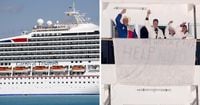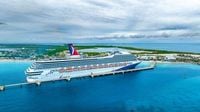In February 2013, what was supposed to be a luxurious cruise turned into a maritime nightmare for more than 4,000 passengers aboard the Carnival Triumph. Departing from Galveston, Texas, and bound for Cozumel, Mexico, the voyage took a disastrous turn when a fire broke out in the ship's engine room. This fire caused a complete power failure, leaving the vessel stranded and adrift in the Gulf of Mexico for nearly a week, with passengers and crew facing a series of harrowing challenges.
The incident, now infamously known as the "Poop Cruise," has been revisited in a new Netflix documentary titled Trainwreck: Poop Cruise, which premiered on June 24, 2025. The 55-minute episode provides a raw and unfiltered look at the chaos that unfolded, featuring firsthand accounts from passengers and crew members who endured the ordeal.
On the fourth day of the cruise, alarms blared, and an "alpha team" call was issued as the fire was detected. Although the crew initially reassured passengers that the situation was under control, the full extent of the crisis soon became apparent. With the ship’s power out, the toilets ceased functioning, air conditioning failed, and refrigeration was lost. Raw sewage began flooding the hallways, creating an unbearable stench and unsanitary conditions that quickly overwhelmed the ship's systems.
Passengers were instructed to urinate in the showers and defecate in red biohazard bags distributed by the crew, a plan devised by cruise director Jen Baxter—nicknamed "Vacation Barbie" by guests. However, as the bags piled up in the corridors, many passengers, like Ashley, who was on a bachelorette trip, resorted to taking Imodium to avoid using them. Chef Abhi described the horrifying sight of clogged toilets filled with a "lasagna" of layered feces and toilet paper, while the cafeteria floors were soaked in urine and excrement.
With temperatures rising inside the ship due to the loss of air conditioning, guests dragged mattresses onto the upper decks, creating a makeshift "tent city" to escape the heat and foul odors. Food supplies dwindled rapidly, forcing passengers to subsist on ham and cheese sandwiches instead of the usual lavish meals. Competition for limited resources led to hoarding, revealing a darker side of human nature amid the crisis.
In an attempt to lift spirits, the crew made the controversial decision to open the bar and offer free alcohol. This move, however, backfired spectacularly. Passengers became unruly, flinging red poop bags, engaging in public sexual acts, and fighting, turning the ship into a chaotic scene of desperation and disorder.
Communication with the outside world was limited, but when a nearby cruise ship came close enough, passengers managed to get mobile signals. They quickly shared their plight with loved ones and the media. Former CNN anchor Brooke Baldwin explained the ensuing media frenzy, noting that CNN provided "wall-to-wall coverage" as the hashtag #CruiseShipFromHell trended online.
The rescue efforts were complicated when the Carnival Triumph drifted over 100 nautical miles away from its intended rescue point in Progreso, Mexico, prolonging the ordeal. Eventually, tugboats towed the ship to Mobile, Alabama, where passengers disembarked on the eighth day. Many kissed the ground upon arrival, relieved to be free from the nightmare. Despite the chaos, passengers praised the crew for their efforts to care for them during the crisis.
Maritime lawyer Frank Spagnoletti, who represented some passengers in legal action against Carnival Cruise Line, argued that the ship should never have been at sea given its history of previous fire incidents. However, Carnival's lawyers cited a clause in the ticket contract that essentially absolved the company of guarantees regarding safe passage, seaworthiness, and sanitary conditions. Spagnoletti remarked, "It's amazing. I think if most people actually knew that existed at the time, they probably would never buy a ticket. I certainly wouldn’t.”
Despite this, in 2015, a Florida judge awarded compensation ranging from $3,000 to $15,000 to 27 passengers. Carnival also provided all affected passengers with a full refund, $500 in compensation, transportation reimbursements, and a voucher for a free cruise. Many, however, declined to return. Passenger Devin Marble, who was on the cruise to meet his then-fiancée's family, decided against legal action and declined the free cruise, preferring to move on from the experience.
In the wake of the disaster, Carnival undertook a massive overhaul of the Carnival Triumph. The ship was cleaned, repaired, and refitted at a cost of $115 million. In 2019, it was rebranded as the Carnival Sunrise, a move intended to distance the vessel from the infamous "Poop Cruise" legacy. The renaming ceremony took place in New York on May 23, 2019, and the ship continues to sail primarily around The Bahamas and the Caribbean.
Carnival President Christine Duffy emphasized that the Carnival Sunrise offers guests an array of exciting new dining, bar, and entertainment options, as part of a broader multi-billion-dollar fleet enhancement program. The company has reportedly invested more than $500 million across its entire fleet to address the design vulnerabilities revealed by the 2013 incident. These investments include comprehensive fire prevention and suppression systems, improved redundancy, and enhanced management protocols.
In a statement to Yahoo Canada and Surrey Live, Carnival acknowledged the incident as "a teachable moment for the entire cruise industry." The company highlighted its commitment to rigorous Health, Environmental, Safety and Security (HESS) protocols, which guide the entire Carnival Corporation fleet. Since 2013, Carnival proudly notes that over 53 million guests have enjoyed safe and memorable vacations aboard its ships.
Despite the grim history, the Carnival Sunrise remains a popular vessel. Recent TripAdvisor reviews describe it as "a lot of fun," with guests appreciating the food, shows, and overall experience, even if the ship shows signs of its age. Cruises are actively booked for 2025, including a four-day Bahamas trip from Miami priced from $284 for an inside cabin to $836 for a luxury suite.
The Netflix documentary Trainwreck: Poop Cruise offers a sobering reminder of the vulnerabilities in cruise ship operations and the human resilience in the face of adversity. It stands as a testament to the importance of safety, preparedness, and transparent communication in the cruise industry—lessons that Carnival and the broader maritime community have taken to heart over the past dozen years.






